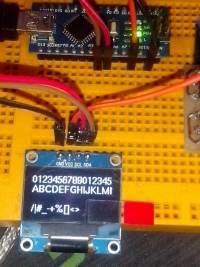Nah, it is probably ssd1306.
It can do both, but maybe they hard wired that module into SPI mode.. look into ssd1306 datasheet.
ESP8266 Community Forum
Open Community Forum for ESP8266, Come share Arduino and IoT (Internet of Things)
https://www.esp8266.com/
i2c OLED Module example
Page 4 of 6
Re: i2c OLED Module example
Re: i2c OLED Module example
$5 USD from China, but you gotta wait:
http://www.banggood.com/0_96-Inch-4Pin-White-IIC-I2C-OLED-Display-Module-12864-LED-For-Arduino-p-958196.html

http://www.banggood.com/0_96-Inch-4Pin-White-IIC-I2C-OLED-Display-Module-12864-LED-For-Arduino-p-958196.html

Re: i2c OLED Module example
Here's a modified version that displays the character 'A'. Hardcoded.
I'm trying to build the OLED library as well but i'm very new to LUA and have no clue how arrays and bitwise operators work. After much struggle i figured out that BIT wise operators are not supported in the firmware, now trying to see if i can recompile the firmware to include support for bitwise operators. Meanwhile if someone manages to get this ahead, keep this thread updated.
I'm trying to build the OLED library as well but i'm very new to LUA and have no clue how arrays and bitwise operators work. After much struggle i figured out that BIT wise operators are not supported in the firmware, now trying to see if i can recompile the firmware to include support for bitwise operators. Meanwhile if someone manages to get this ahead, keep this thread updated.
Code: Select all
id=0 -- need this to identify (software) IC2 bus?
sda=5 -- connect to pin GPIO14
scl=7 -- connect to pin GPIO12
addr=0x3C -- the I2C address of our device
i2c.setup(id,sda,scl,i2c.SLOW)
function read_reg(dev_addr, reg_addr)
i2c.start(id)
i2c.address(id, dev_addr ,i2c.TRANSMITTER)
i2c.write(id,reg_addr)
i2c.stop(id)
i2c.start(id)
i2c.address(id, dev_addr,i2c.RECEIVER)
c=i2c.read(id,1)
i2c.stop(id)
return c
end
function write_reg(dev_addr, reg_addr, reg_val)
i2c.start(id)
i2c.address(id, dev_addr, i2c.TRANSMITTER)
i2c.write(id, reg_addr)
i2c.write(id, reg_val)
i2c.stop(id)
end
function oled_command(cmd)
write_reg(addr,0x00,cmd)
end
function display()
oled_command(0x21) -- set column addresses
oled_command(0x00) -- reset column start address
oled_command(0x7F) -- reset column end address
oled_command(0x22) -- set page addresses
oled_command(0x00) -- reset page start address
oled_command(0x07) -- reset page end address
end
function init_oled() -- Initialises the 128x64 oled
print("starting")
oled_command(0xAE) -- turn off oled panel
oled_command(0xA8) -- set multiplex ratio to 1 byte following
oled_command(0x3F) -- 1/64 duty (N+1 MUX: 1-64))
oled_command(0xD3) -- set display offset to 1 byte following
oled_command(0x00) -- no offset
oled_command(0x40) -- set start line address
oled_command(0xA0) -- set segment remap
oled_command(0xC0) -- set COM output scan direction
oled_command(0xDA) -- set com pins hardware configuration to 1 byte following
oled_command(0x12) -- set pins
oled_command(0x81) -- set contrast control register
oled_command(0x7f) -- reset contrast to default value
oled_command(0xA4) -- set display on
oled_command(0xA6) -- set normal display
oled_command(0xD5) -- set display clock divide ratio/oscillator frequency
oled_command(0x80) -- set divide ratio
oled_command(0x8D) -- set Charge Pump enable/disable
oled_command(0x14) -- set(0x10) disable
oled_command(0xAF) -- turn on oled panel
print("Init done")
end
function fill()
for m=0,7 do
oled_command(0xb0+m)
oled_command(0x00)
oled_command(0x10)
for n=0,131 do
write_reg(addr,0x40,0x00)
end
end
end
function OLED_ShowChar()
x=2
y=60
OLED_SetPos(x,y)
write_reg(addr,0x40,0x7C)
write_reg(addr,0x40,0x12)
write_reg(addr,0x40,0x11)
write_reg(addr,0x40,0x12)
write_reg(addr,0x40,0x7C)
end
function OLED_SetPos(x,y)
oled_command(0xb0+y)
oled_command(0x10)
oled_command(0x01)
end
init_oled()
fill()
OLED_ShowChar()